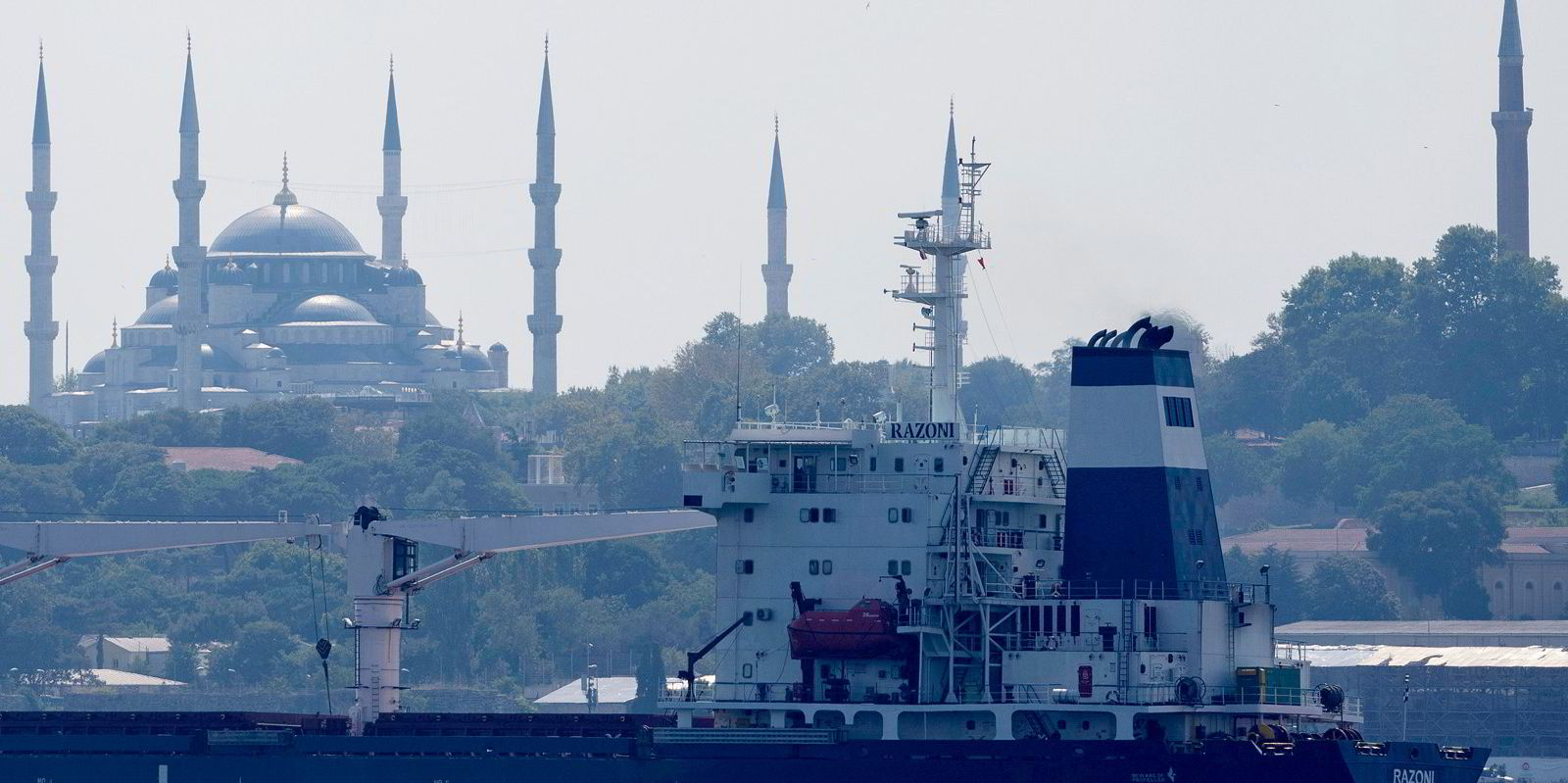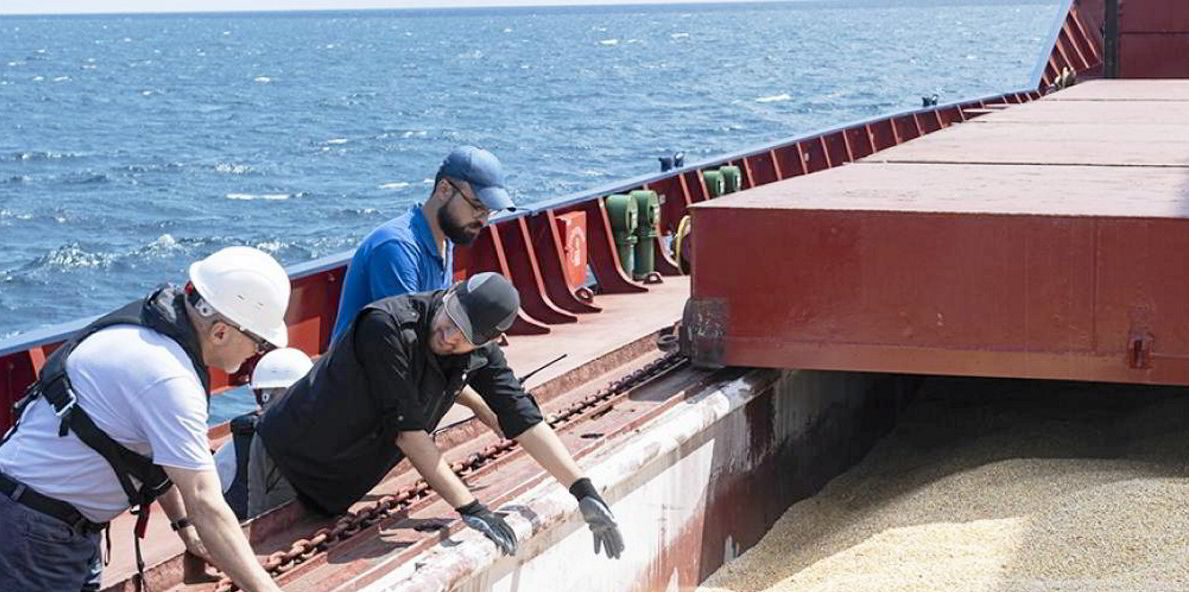As a United Nations-led initiative to ship Ukrainian grain nears its expiration date next month, the government in Kyiv is stepping up its campaign against Russia to renew the deal on more favourable terms for the invaded country.
Russian ship inspectors working in Istanbul as part of UN-led teams are dragging their feet, leading to a queue of 140 inbound and outbound ships in the Bosphorus, two Ukrainian ministers said in a joint statement on Wednesday.
“They often demand unregulated documentation, refuse to work during working hours and look for other groundless reasons to stop the inspection,” infrastructure minister Oleksandr Kubrakov and foreign minister Dmytro Kuleba said in a joint statement demanding that the UN and Turkey, which have mediated the deal, rectify the situation.
“Every day only half of the planned 10 inspections take place,” the two Ukrainian officials added, saying that the “vast majority” of stuck vessels have been off Istanbul for more than a month.
If it was not for Russian delays, 10m tonnes of additional foodstuffs would have been exported from Ukraine, contributing to the stability of world food prices, Kurbrakov and Kuleba argued.
This is not the first time that Ukraine has complained about perceived Russian foot-dragging in the Bosphorus.
But such complaints have not been issued in such a formal manner before.
This may be due to ongoing talks to renew the deal, which started in August last year, being extended in November with the deal due for renewal again next month.
Ukraine wants the deal to be expanded to include the ports of Mykolaiv and Kherson, alongside the Odesa, Chernomorsk and Yuzhny/Pivdennyi terminals, which have been part of it since the beginning.
Such an expansion would allow the repatriation of more than 60 vessels, which are currently stranded in Ukraine since Russia’s invasion in February last year.
Some of them in Kherson are known to have been the victim of rocket attacks, without known human casualties.
Russia has yet to formally respond to the latest Ukrainian note.
Under the terms of the scheme, inbound and outbound ships must be vetted by UN, Turkish, Russian and Ukrainian officials, who check documentation and make sure there are no weapons or unauthorised cargo and personnel on board.
In a statement in October, when a queue of more than 120 ships had formed in the Bosphorus, the Istanbul-based Joint Coordination Centre (JCC), the UN body operating the scheme, attributed the delays largely to its very success.
According to UN data compiled by TradeWinds, 737 laden ships had left Ukraine as of 14 February, carrying more than 21m tonnes of corn, barley, wheat, soybeans, peas, rapeseed and sunflower oil.
The vast majority of these ships, a total of 525, belong to Greek and Turkish interests. On account of the vessels’ bigger size, Greek companies such as Eastern Mediterranean Maritime account for more than half of the cargo.
The Black Sea Grain Initiative is attractive for shipowners because ships trading under its protection usually earn about twice the rates bulkers fetch in other parts of the world.
The sheer number of ships flocking to the Black Sea Grain Initiative or seasonal factors, however, cannot be the only reasons for the delays.
TradeWinds’ analysis of the UN figures produced some data supporting Ukraine’s claim that Russian foot-dragging plays a role.
The number of recorded voyages dropped sharply after Moscow briefly withdrew from the scheme at the end of October, citing abuse of the corridor by Ukraine for military purposes.
After reaching a monthly peak of 180 in October, laden ship departures from Ukrainian ports shrank to 85 in November and recovered only slightly to 106 in December. They dropped again to 78 in January and stand at 47 so far this month.
Individual ship data confirms the delays. Greek brokers reported on 13 January that Agrocorp fixed the 63,900-dwt SSI Vigilant (built 2022) for a spot trip to Bangladesh, via Ukraine, at $20,000 per day.
According to UN data, it took the vessel one month to depart Odesa on 11 February with 57,200 tonnes of wheat destined for the Asian country.
As the Black Sea Grain Initiative hits bottlenecks, Russia’s own Black Sea grain trade — some of it carried out from Ukrainian ports occupied by Russian forces, is alive and kicking.
According to the Ukrainian note on 15 February, traffic volume through Russian seaports in the Azov and Black Seas increased to more than 250m tonnes in 2022.
None of these vessels are inspected in the Bosphorus.





